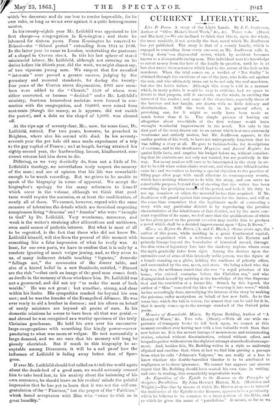CURRENT LITERATURE.
Lice It Down. A story of the Light Lands. By J. C. Jeaffreson, Author of "Olive Blake's Good Work," &c., &c. Three vols. (Hurst and Blackett.)—We are inclined to think that this is. upon the whole, the most readable, if not actually the best, novel which Mr. Jeaffreson has yet published. The story is that of a county family, which is engaged in concealing from every one—or, as Mr. Jeaffreson calls it, "living down "—a disgraceful secret, which by accident becomes known to a disreputable racing man. This individual uses his knowledge to extort money from the heir of the family in question, until he is at last shot under circumstances which lead to the arrest of the heir as his murderer. When the trial comes on, a verdict of "Not Guilty" is obtained through the exertions of one of the jury, who holds out against the rest, and who ultimately turns out to he not only the real murderer, but also the heir's father. Although this story is told in a manner which, in many points, it would be easy to criticize, had we space to devote to that purpose, still it succeeds, on the whole, in exciting the interest of the reader; and sonic of the characters, especially those of the heroine and her family, are drawn with no little delicacy and discrimination. Still the book is, in its general effect, a provoking one, for it might so easily have been made so much better than it is. The simple process of leaving out altogether about two-thirds of the first volume would have wrought wonderful improVement in the novel. Not only is the first part of the story drawn out to an extent which is at once extremely wearisome and entirely useless, but Mr. Jeaffreson appears, in the earlier portion of his work, to have not unfrequently forgotten that he was telling a story at all. He goes to fashion-books for descriptions of costume, and to the Gentleman's Magazine and Annual Register for quaint little facts, and empties his budget before us, without consider- ing that its contents arc not only not wanted, but am positively in the way. Not many readers will care to be interrupted in the story in or- der to be told when sedan-chairs went out, and when slate billiard-tables came in ; and we confess to having a special objection to the practice of filling page after page with small allusions to contemporary events, which have nothing whatever to do with the story, and can serve no conceivable purpose, beyond that of showing that the writer has been consulting the gossiping recoils of the period, and feels it his duty to use up, somehow or other, the material he has thus acquired. If Mr. Jeaffreson will guard against this temptation for the future, and will at the same time remember that the legitimate mode of connecting a story with any particular district is by reproducing the peculiar characteristics of the inhabitants of that district, not by the mere con- stant repetition of its name, we feel sure that the qualifications of which he has given proof on the present occasion may enable him to produce a novel which shall be a decided improvement upon "Live It Down." .






























 Previous page
Previous page